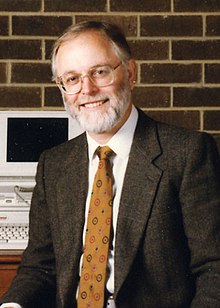This article may rely excessively on sources too closely associated with the subject, potentially preventing the article from being verifiable and neutral. (December 2020) |

Graeme Donald Snooks (born 1944 in Perth, Western Australia) is a systems theorist and stratologist who has developed a general dynamic theory to explain complex living systems.[1] His resulting "dynamic-strategy theory" (DST) has been employed to analyse the fluctuating fortunes of life over the past 4,000 million years (myrs) and of human society over the past 2 myrs; to analyse contemporary economic problems (inflation,[2] financial crises,[3] climate change[4]); to explore socio-political issues (population expansion, the emergence of democracy, the "clash of civilizations", disease (COVID-19) control, the failure of strategic leadership); to analyse the emergence, operation, and malfunction of the mind; and to make scientific predictions about the future.[5] New discoveries emerging from Snooks' publications include: existential schizophrenia, strategic frustration, strategic selection, the growth-inflation curve, the strategy function, the logological constant (akin to the cosmological constant), the Snooks–Panov Vertical (or the singularity), technological paradigm shifts, the Solar Revolution, and, most importantly, the strategic logos. His body of work challenges the existing paradigms of orthodox (neo-classical) economics, climate-mitigation economics, Marxism, neo-Darwinism, evolutionary psychology, self-organisation theory, and all other supply-side systems.
For twenty-one years, from 1989 to 2010, Snooks was the foundation Coghlan Research Professor of Economics in the Institute of Advanced Studies at the Australian National University. Currently he is the Executive Director of both the Institute of Global Dynamic Systems and IGDS Books[6] in Canberra. He was educated at Mount Lawley Senior High School (1957–1961), the University of Western Australia (BEc, 1966; MEc, 1968), and the Australian National University (PhD, 1972). Snooks has been elected Fellow of the Australian Academy of Social Sciences (1991), Fellow of the Royal Historical Society (UK) (1990), and Fellow of the Russian Academy of Humanities (elected 2006, resigned in protest 2022).
- ^ "Graeme Donald Snooks".
- ^ "Archived copy" (PDF). Archived from the original (PDF) on 22 July 2008. Retrieved 17 March 2010.
{{cite web}}: CS1 maint: archived copy as title (link) - ^ "Archived copy" (PDF). Archived from the original (PDF) on 13 September 2009. Retrieved 17 March 2010.
{{cite web}}: CS1 maint: archived copy as title (link) - ^ http://econrsss.anu.edu.au/pdf/GDSC/WP010.pdf[permanent dead link]
- ^ http://econrsss.anu.edu.au/pdf/GDSC/WP010.pdf[permanent dead link]
- ^ "Global Dynamic Systems Centre Working Papers - Economics Program - RSSS - ANU". Archived from the original on 30 March 2009. Retrieved 7 May 2009.